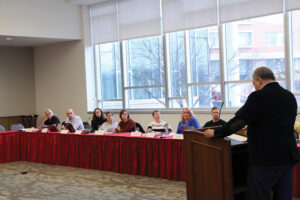
The Academic Senate meeting allowed several campus communities to announce their plans for the rest of the year and for the start of the fall semester.
The meeting was held on April 2 with 35 university representatives in attendance. The purpose of the new changes presented to the Senate was for their approval to be received.
Student Government Association President and computer information systems junior Stephen Bender announced changes he plans to make to SGA at the Academic Senate meeting.
“The SGA approved four $500 scholarships being offered to members who have made an impact on campus in the past year through volunteering and submitted an evaluation form through SGA,” Bender said. “Also, the SGA is going to be restructured next year to include internal committees that serve as ‘vessels of change’ for students to utilize on campus and how we are finalizing an SGA beginner guide for new members.”
According to Bender, the changes involving internal committees are exciting because it is something the SGA hasn’t seen in a while and is a new concept. He also stated that members getting scholarships would encourage others to join the association and help them realize they can make a large impact.
Other changes were mentioned at the meeting due to the potential for big impacts on faculty and students, which social work professor Michael Berghoef found important.
“I’m most excited about our ongoing discussions about AI, both creative and problematic aspects of it,” Berghoef said. “I’m also excited about our own grant, awarded to the Shoah Project committee, where we will be visiting Zekelman Holocaust Center in Farmington Hills and the Arab American in Dearborn. I’m very excited that we can offer this all-day educational excursion at no expense to students.”
The committee will be taking the trip on Friday, April 12, and Berghoef hoped many chose to sign up to learn more about the educational excursion.
The Academic Senate President and an Associate Professor of Public Health Emmanuel Jadhav found the Academic Senate to be a place for changes to be made toward the university.
“The Academic Senate is such a great platform for initiating changes at the levels of policies, program levels, student life and faculty development,” Jadhav said. “I am really interested in how we bring about institutional changes that make up our programming robust.”
Despite some changes involving excitement, Jadhav mentioned that changes don’t always come with a simple agreement. There can be disagreements and challenges along the way for a change to be considered, according to Jadhav.
“I’ve got to experience many things, and one of them is coming across the fact that policy is not easy,” Jadhav said. “You’re going to displease somebody along the way, and the goal is to not make them mad. If we can maintain that collegiality, then I’ve done my job. I want everybody to come back and have healthy discussions and not get upset with each other.”
The Academic Senate will have its final meeting of the academic year on Wednesday, May 1.
C.E. -EC / AM
